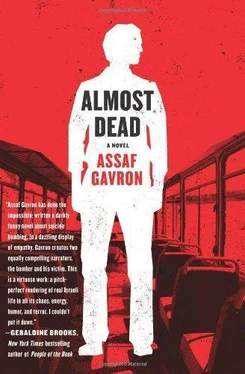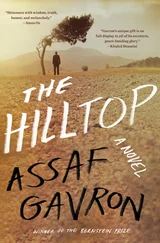Almaz, the investigator from Tel Aviv, invited me to a meeting in a café in Yehuda Maccabi Street. He wasn’t wearing a policeman’s uniform. He didn’t show films. It was a pleasant conversation. He was of Egyptian origin, lived in Bublik Street in the north of Tel Aviv, married to an Irish woman he’d met on a flight. After the small talk we discussed the attack. I told him everything I knew, about Guetta and his life in Jerusalem. I told him that Shuli and Guetta’s parents had no idea what he was doing in Tel Aviv that morning, and that Shuli and I had decided to find out about it. He said that being in a certain city without telling your parents or girlfriend was not a criminal offence. Maybe, I said, but it was still interesting, and I wanted to do it so that I would have an answer for Shuli when she woke up. He said, ‘Sure, go for it.’ I told him about the PalmPilot and he smiled and said he could arrest me for theft.
‘Come on. I’ll give what’s left of it back to the family. I’ve got the best intentions.’
‘That’s what everyone says,’ he said. ‘But the law says you don’t.’
The gamblers saw me on Noah’s Ark too and they wanted a piece. The gamblers — or ‘Itzik’, to give my caller his name — lived in Netanya and operated an illegal casino on the second floor of a ‘normal pub’ (his description) in the city’s industrial zone. I refused his invitation to come and drink ‘whatever I fancied’ on the house. Among other activities in the casino he was operating a numbers racket, betting on football matches and terrorist attacks.
I have to confess here that I had myself once placed a few shekels on an Attack Pool. Bar had organised one at work — where the next attack would be and how many would be killed. I said Jerusalem and four. It was three but I won the pot — thirty-five shekels. Then Bar told me he had friends in Holon who gambled professionally on attacks. I gave him a hundred-shekel note to place on Jerusalem. Two weeks later I got two hundred back. So when Itzik called me, it wasn’t the idea of gambling on attacks which surprised me so much as his proposition to me.
‘I want to employ you as an expert,’ he explained. ‘Tell me where the next attack’s gonna be and I can rig the odds according to what you say.’
‘What?’ I was in the street. I had to stop and sit on a bench. ‘Why am I an expert?’
‘You think I didn’t see Noah’s Ark ? I’ll give you a thousand dollars a month. Retainer. Whatever happens, attacks yes or no, whatever, you get a thousand a month. Just tell me where the next attack’s going to be.’
‘Tell me, Itzik, do you…’
‘OK, listen. Don’t tell me where the attack’s going to be, just tell me where you’re going to be.’
‘Itzik…I’m sorry. I can’t. I never leave Tel Aviv anyway.’
‘Two thousand dollars. Two grand a month for scratching your balls. How bad can that be?’
‘It’s not bad at all.’ It really wasn’t. ‘But I just happened to be in several attacks in a single week. It was just a coincidence. Doesn’t mean a thing. A few weeks have passed since then and nothing’s happened anywhere I’ve been to.’
‘There haven’t been any attacks since then,’ said Itzik.
Invitations to movie premieres, a psychologist wanting to try out a radical new therapy, Shlomo Yarkoni’s widow, the army looking for an inspirational/motivational speech, flower shops wanting me to advertise them, Shlomo Yarkoni’s girlfriend, an offer to be a judge in a children’s talent show…
And Humi’s parents came to visit. His mother had a tale of terrible woe to tell me. Humi’s brother had been killed at the age of ten by one of those exploding soft-drinks bottles they ended up having to recall. Tempo , the drink was called. The PLO should have used it. They were now divorced. Five months ago Humi’s grandfather on his father’s side had died of prostate cancer. Four months ago his grandmother on his mother’s side succumbed to Alzheimer’s. And now Humi.
She said: ‘You think it’s a normal day and it just isn’t. It turns your life upside down. There are so many things I have to talk to him about. You, your life is nice and safe and warm and pleasant and you’ve got your family and friends. There are no tragedies in your life.’ I mumbled something about getting on with life and she didn’t like it. She said, ‘You’re wrong. You’re so wrong. You can’t get on with life. Not after losing a child. The grieving never ends.’
‘Etti, stop it, stop it, please. It’s not his fault.’
‘I didn’t say it was his fault, but how can he sit there and tell me about getting on with life?’ Etti replied, tears falling now. The ex-husband rolled his eyes at me. There was a radioactive tension between the two of them. Maybe they needed it. Because when she lowered her head, a look of complete despair overtook his face too.
Al-Amari was becoming unbearable. The curfew was lifted and then reimposed, and every night the Israelis staged raids, shouldering their way into houses, breaking furniture and confiscating property, yelling and hitting people. They would lead all the men outside and hold them in plastic cuffs and cloth blindfolds for several hours before detaining a random few. They were pushing money at anyone who might talk, and in Ramallah there were plenty of dogs who would. Twice they battered at our door in the middle of the night and marched me down to the mosque, where I was made to kneel for hours, blindfolded and in pain. Not wanting to risk getting picked up, Bilahl slept on the roof, which was a much greater risk in itself. Under these circumstances the mother of all operations wasn’t getting anywhere. The money from Gaza was trickling away and I tried to help Jalahl out with little electrical jobs, but he didn’t have enough work for himself. I sat at home and watched TV, but there’s a limit to the number of times you can watch The Weakest Link .
One day, many weeks after the last attack, water ceased to flow from the taps. The hot days had come as hot days always do; too soon. Within an hour there were no bottles in the grocery stores. I was thirsty, and being thirsty made me think about Mother, and thinking about Mother made me think of Lulu. I missed her intensely. I hadn’t seen her for months. I called home and she answered. She was all right; Father was all right but sad. Everything was the same as ever. But her voice was different, I thought, more serious, the voice of a thirteen-year-old girl putting her childhood behind her. It made me frantic to see her.
‘Lulu, I’m coming to visit you.’
‘Really? Really really? When?’
‘Right now,’ I said.
When I was a kid, Grandfather Fahmi would ride from Al-Amari to visit us in Murair. It would take him an hour. Today, in a car, it takes three hours if you’re lucky. Twenty kilometres as the crow flies. Where else in the world does it take longer to get from place to place as the years go by?
I chucked a few clothes into a holdall and left. The camp glowed yellow in the bright morning light. Every building was still wallpapered with posters and graffiti about Mahmuzi and Halil; huge chunks of concrete lay scattered about the streets. At an army post on the way out of the camp a soldier in sunglasses waved me over. He checked my green ID card, opened the bag, took everything out, turned it inside out and then shook it. He frisked me roughly. ‘Where you going?’ he asked in Hebrew. ‘Murair.’ ‘Where is it?’
I pointed in roughly the right direction. ‘Don’t point, say where it is.’ I didn’t know what to say. ‘It’s over there, beyond Ramallah.’ I had to explain why I was travelling. He demanded I show him a Tasrich —a permit to move freely around the West Bank — and I showed him the permit Jalahl had managed to get hold of from the electricity company in Ramallah. Then I got detailed instructions, what I could do and what I couldn’t. I nodded. I turned left towards Ramallah and walked along the main road that cuts through the city north to Nablus, until the checkpoint was out of sight. Then I stopped and waited until I managed to get a lift. Five minutes later we were at the Beitin checkpoint.
Читать дальше












